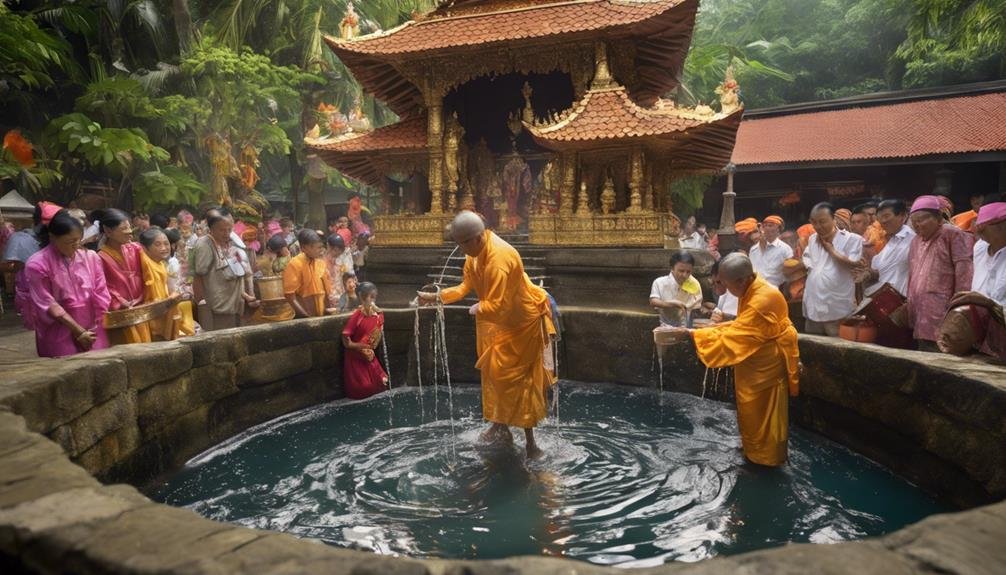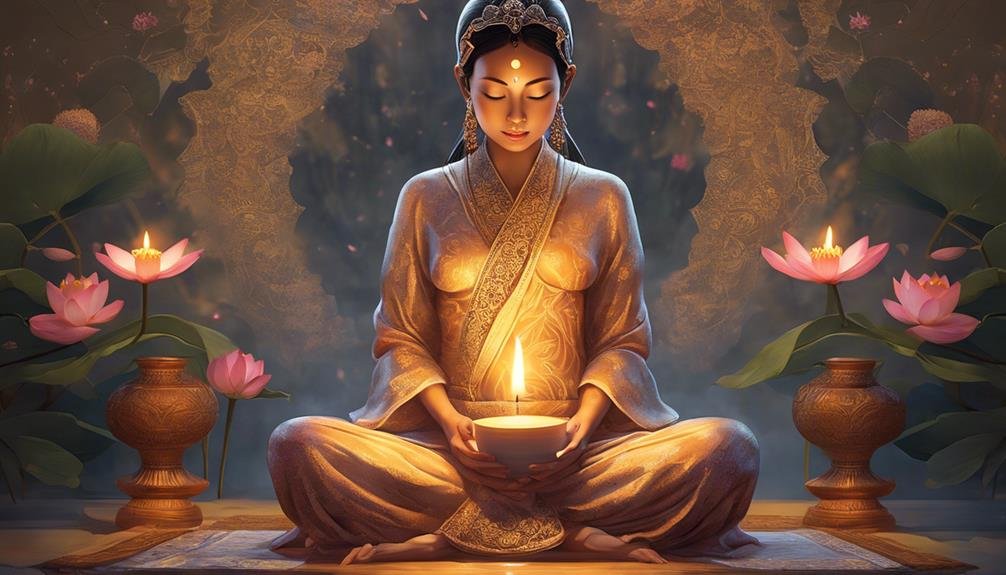Immerse yourself in the sacred celebration of Waisak Day in Indonesia, also known as Vesak. This special day commemorates the life of Prince Siddhartha Gautama and encompasses the fundamental teachings of Buddhism – enlightenment, compassion, and peace. Witness water blessings and eternal flame lighting, colorful processions, and enchanting music that create a spiritually enriching atmosphere. Through traditional rituals like water purification and charity offerings, this day promotes inner reflection, generosity, and unity. Explore how Waisak Day intertwines cultural heritage with spiritual practices for a profound experience that fosters harmony and spiritual growth.
Key Takeaways
- Commemorates Prince Siddhartha Gautama's life events.
- Rooted in Buddhism's teachings of enlightenment and liberation.
- Reflects core principles like compassion and peace.
- Includes water blessings, eternal flame lighting, and charity offerings.
- Celebrated with cultural processions, music, and spiritual rituals.
Significance of Waisak Day in Indonesia
Waisak Day in Indonesia holds profound significance as it commemorates the pivotal life events of Prince Siddhartha Gautama, marking his birth, enlightenment, and parinirvana. The historical origins of Waisak Day trace back to the decision made at the World Fellowship of Buddhists conference in 1950, where it was established as Trisuci Waisak. This day is deeply rooted in the teachings of Buddhism, symbolizing the enlightenment and ultimate liberation from the cycle of rebirth.
In modern interpretations, Waisak Day in Indonesia signifies not only the life of Prince Siddhartha Gautama but also serves as a reminder of the core principles of Buddhism, such as compassion, peace, and mindfulness. It's a time for believers to reflect on the teachings of the Buddha and endeavor to cultivate inner peace and harmony. The rituals performed during Waisak Day, including water blessings and charity acts, highlight the importance of selflessness and giving back to the community. By celebrating Waisak Day, Indonesians honor their cultural and spiritual heritage while embracing the universal values of Buddhism.
Cultural Celebrations and Ceremonies
During the cultural celebrations and ceremonies of Waisak Day in Indonesia, you'll witness traditional rituals like water blessings and lighting eternal flames. Symbolic offerings and rituals play a significant role, alongside festive processions and melodious music that add vibrancy to the festivities.
These practices intertwine to create a rich array of cultural expressions during this auspicious occasion.
Traditional Ritual Practices
Amidst the vibrant cultural fabric of Indonesia, traditional ritual practices during Waisak Day intricately weave together centuries-old customs with spiritual significance. Participants engage in various ceremonies such as the water blessing, symbolizing purification and the cleansing of the mind and soul. Lighting eternal flames represents enlightenment and the constant presence of Buddha's teachings. These rituals are deeply rooted in Buddhist traditions, emphasizing the importance of compassion and spiritual growth. The national Waisak celebration at Borobudur Temple includes additional ceremonies like pradaksina and processions, enriching the spiritual experience for all attendees. Through these practices, individuals connect with the core principles of Buddhism, fostering inner peace and renewal. Witnessing these rituals firsthand offers a profound insight into the rich cultural fabric of Indonesia.
| Ritual | Significance |
|---|---|
| Water Blessing | Purification and cleansing of the mind and soul |
| Eternal Flames | Symbol of enlightenment and the eternal presence of Buddha's teachings |
| Pindapatta Offerings | Charity offerings to promote generosity and selflessness |
| Samadhi Meditation | Practice of deep meditation to achieve spiritual insight and tranquility |
| Pradaksina | Walking around a sacred object to show reverence and respect |
Symbolic Offerings and Rituals
In the fabric of Indonesia's cultural heritage, the symbolic offerings and rituals of Waisak Day mirror a profound intertwining of tradition and spirituality. During this important day, water blessings symbolize purification and generosity, emphasizing the cleansing of one's spirit and the act of giving back to others.
The ritual of Pindapatta holds significant importance as food offerings are made to monks, highlighting acts of kindness and charity, fostering a sense of community and compassion. The Samadhi ceremony, a form of meditation, plays a vital role in Waisak observance, encouraging inner reflection and spiritual growth.
These symbolic gestures, along with traditional rituals like lighting the eternal flame and honoring Buddha's life events, enrich the cultural richness of Waisak celebrations in Indonesia.
Festive Processions and Music
Festive processions and lively music intertwine harmoniously, creating a vibrant mosaic of cultural celebrations during Waisak Day in Indonesia. Colorful parades featuring intricate decorations and participants clad in traditional costumes fill the streets, captivating onlookers with their beauty and symbolism. The sound of chanting and hymns resonates through the air, enhancing the spiritual ambiance of the festivities. Traditional Indonesian instruments like gamelan add a melodious touch to the celebrations, inviting everyone to sway to the rhythmic beats. At Borobudur Temple, processions are adorned with floral offerings and lanterns, paying homage to Buddha's teachings in a visually stunning manner. Cultural performances, including dance and drama, further enrich the event, showcasing the nation's rich artistic heritage.
| Festive Processions | Lively Music | Vibrant Cultural Celebrations |
|---|---|---|
| Colorful Parades | Chanting | Spiritual Ambiance |
| Traditional Costumes | Gamelan | Melodious Atmosphere |
| Intricate Decorations | Hymns | Rich Artistic Heritage |
Borobudur Celebration Symbolism
Explore the profound Borobudur Celebration Symbolism, which investigates the architectural significance, rituals, offerings, and spiritual teachings depicted at this iconic temple.
Uncover the unity and tolerance symbolized by Borobudur during the Waisak Day celebrations, reflecting deep cultural values.
Engage in the Pindapatta Ritual and the Samadhi stage to understand the symbolic acts and spiritual essence embedded in the Borobudur festivities.
Borobudur's Architectural Significance
Nestled in the heart of Indonesia lies Borobudur Temple, a UNESCO World Heritage Site revered for its profound architectural significance and spiritual symbolism. The temple's architectural design mirrors a spiritual journey, with its nine stacked platforms symbolizing the stages of enlightenment in Buddhist cosmology.
Intricate carvings adorn Borobudur, depicting Buddhist teachings and stories that guide visitors through a visual narrative of the religion's principles. As pilgrims traverse the temple's layout, they follow a path towards spiritual enlightenment, culminating in the central dome representing Nirvana – the ultimate goal of Buddhist practice.
Borobudur's structure not only showcases remarkable craftsmanship but also serves as a powerful symbol of the spiritual quest for enlightenment, inviting visitors to explore its sacred teachings.
Rituals and Offerings
As you immerse yourself in the Waisak Day festivities at Borobudur Temple, the rituals and offerings take on a profound symbolism of purification and generosity, reflecting the core tenets of Buddhist teachings.
The water blessing ceremony, where devotees sprinkle water as a form of cleansing and renewal, symbolizes the purification of the mind and spirit. Additionally, the act of Pindapatta, offering food to monks, highlights the importance of charity and compassion in Buddhism.
These rituals not only hold spiritual significance but also preserve Indonesia's rich cultural heritage. The blending of ancient traditions with contemporary practices during Waisak celebrations at Borobudur Temple creates a unique and deeply meaningful experience, emphasizing the values of generosity, respect, and the continuity of Buddhist customs.
Spiritual Teachings Depicted
Symbolizing unity and tolerance in Indonesia, the Borobudur Temple celebration during Waisak depicts profound spiritual teachings through symbolic rituals and ceremonies.
At Borobudur, meditation plays a significant role in Waisak symbolism, emphasizing the importance of inner reflection and mindfulness.
The Blessing Water Retrieval and Pindapatta Ritual are key ceremonies that highlight the core teachings of Buddhism, promoting acts of kindness and generosity.
During the Waisak observance at Borobudur, participants engage in symbolic acts at the Samadhi stage, focusing on spiritual renewal and purification of the mind.
Through these rituals, the celebration at Borobudur encourages individuals to embody compassion and understanding, fostering a sense of spiritual connection and harmony within the community.
Unity and Tolerance Reflection
Indonesia's celebration of Vesak at Borobudur Temple epitomizes the nation's commitment to unity and tolerance. The gathering of people from diverse backgrounds showcases Indonesia's unity in diversity. During Vesak, the atmosphere is filled with a sense of harmony and respect as individuals come together to commemorate this auspicious day.
The ceremonies held during Vesak serve as a reminder of the importance of understanding and respecting different communities. Through rituals like Pindapatta and Samadhi, Vesak emphasizes the values of tolerance and acceptance, encouraging individuals to embrace one another regardless of their differences.
The historical significance of Vesak celebrations reflects Indonesia's enduring values of unity and highlights the nation's dedication to fostering an inclusive society. By promoting unity and tolerance, Vesak plays a crucial role in strengthening the fabric of Indonesian society and fostering a sense of togetherness among its people.
Rituals of Blessing Water Retrieval

The next significant aspect of Waisak Day celebrations in Indonesia involves the profound ritual of Blessing Water Retrieval. This ritual symbolizes water purification and the receipt of spiritual blessings. Participants collect blessed water, believing it carries positive energy that will enhance their spiritual practices.
The retrieved blessed water is utilized in various ceremonies and rituals throughout Waisak, emphasizing the importance of purity and compassion in Buddhist teachings. By engaging in this practice, individuals not only purify themselves but also cultivate a sense of generosity and empathy towards others.
The act of retrieving blessed water serves as a reminder of the interconnectedness of all beings and the significance of spreading kindness and goodwill. Through this ritual, participants actively engage in compassion practices, seeking to embody the values of harmony and spiritual growth.
The Blessing Water Retrieval ritual stands as a poignant example of how simple acts can hold profound meanings in fostering inner peace and collective well-being during Waisak Day celebrations in Indonesia.
Emphasis on Purification and Generosity
During the vibrant Waisak Day celebrations in Indonesia, a profound emphasis on purification and generosity resonates throughout the community. Purification practices play a central role during Waisak, with the Blessing Water symbolizing the cleansing of negative energies. This ritual serves as a powerful reminder of the importance of purifying one's mind and spirit.
Additionally, the observance of the Ritual of Pindapatta underscores the significance of generosity. This tradition encourages acts of kindness and giving towards monks and the wider community, fostering a spirit of compassion and selflessness.
The focus on purification and generosity during Waisak highlights the core Buddhist values that are celebrated during this auspicious occasion. By engaging in these practices, individuals not only cleanse their own hearts and minds but also contribute to the well-being of others. These traditions reflect the essence of Waisak – a time for inner reflection, spiritual growth, and the embodiment of kindness and generosity.
Spiritual Reflection and Meditation

Amidst the serene ambiance of Waisak Day celebrations, engaging in spiritual reflection and meditation intertwines with the essence of inner peace and enlightenment. During this auspicious occasion, devotees explore the following practices:
- Contemplating Buddha's Teachings: Spiritual reflection involves pondering over the profound wisdom and teachings of Buddha, seeking to apply them to one's own spiritual journey.
- Focus on Inner Peace and Mindfulness: Meditation sessions during Waisak emphasize the cultivation of inner peace and mindfulness, allowing individuals to connect with their inner selves and the world around them.
- Cultivating Compassion and Wisdom: Through deep meditation, devotees aim to nurture compassion, enhance wisdom, and foster self-awareness, leading to personal growth and spiritual development.
- Promoting Mental Clarity and Spiritual Growth: The meditative practices of Waisak not only promote mental clarity and emotional balance but also facilitate spiritual growth, enabling individuals to deepen their connection to the teachings of Buddha and undergo inner transformation.
Frequently Asked Questions
When Is Waisak Borobudur 2024?
You can experience the Waisak celebration at Borobudur in 2024 on May 23rd. Engage in traditional activities like water blessings, eternal flame lighting, and the Pindapatta ceremony. The Samadhi ritual for meditation and reflection is an essential part of the festivities.
What Religion Is Vesak Day For?
Vesak Day is a Buddhist celebration with deep cultural significance. It honors the birth, enlightenment, and passing of Buddha Gautama. This religious observance emphasizes compassion, peace, and enlightenment, highlighting the core values of Buddhism.
What Day Does Vesak Day Commemorate?
Vesak Day commemorates Buddha's enlightenment and final departure, significant events in Buddhist traditions. It marks the birth of Prince Siddhartha, his attainment of enlightenment, and emphasizes peace, compassion, and spiritual enlightenment.
When Is Buddha's Birthday in 2024?
In 2024, Buddha's birthday will be celebrated on the first full moon day of May. The 2024 celebration may include rituals like water blessing and meditation. It's a significant day to commemorate the birth, enlightenment, and passing away of Prince Siddhartha.
Conclusion
As you reflect on the significance of Waisak Day in Indonesia, you witness the cultural celebrations and ceremonies that highlight unity and tolerance.
The Borobudur celebration symbolizes spiritual reflection and meditation, emphasizing purification and generosity.
Through rituals of blessing water retrieval, you experience a sense of connection and renewal.
Waisak Day serves as a reminder to embrace the values of compassion and harmony, fostering a deeper understanding of oneself and others.



